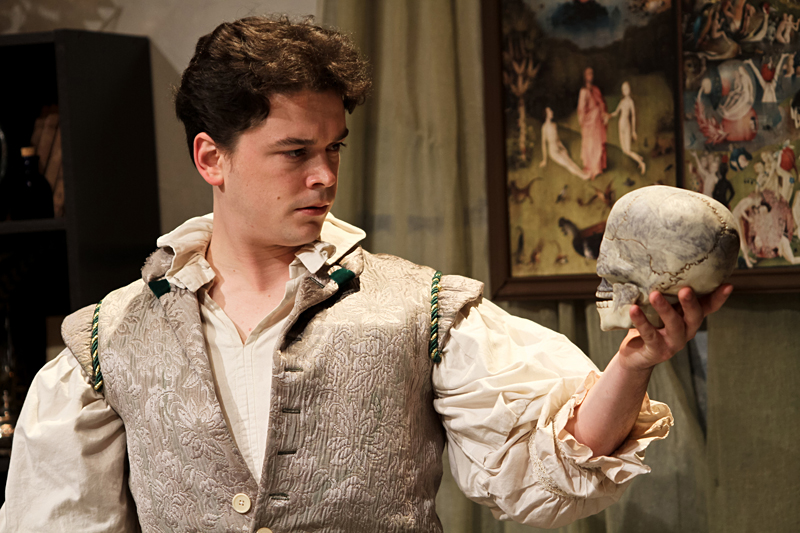How did Prince Hamlet get so dithery? That is the question posed in David Davalos’ endearingly obnoxious comedy about the battle between two professors at Wittenberg University for young Hamlet’s soul. Like Rosencrantz and Guildenstern Are Dead, Wittenberg appropriates Hamlet for its own purpose. Or purposes, actually, and too many of them. Perhaps like its unformed hero (and this is a charitable view), the 2007 play doesn’t seem to know what it wants to be. Its angsty, adolescent mood swings from slapstick to haunted, bawdy to bombastic.
Thus our undergraduate hero (Connor Toms) gyrates between the ribaldry at the Bumhole Tavern and the piety back on campus. He’s an impressionable, intellectual shuttlecock in the faith-vs.-reason debate being argued by Martin Luther and Dr. Faustus, respectively. The two profs have been spurred to ideological war by Copernicus’ discovery that the Earth rotates around the sun. (The celestial news merely makes Hamlet motion-sick). Faustus (lithe Chad Kelderman) asks his pupil to follow reason and embrace corporal pleasure. No—come help me purify the church instead, says Martin Luther (Michael Patten in a suitably ridiculous Dorothy Hamill tonsure).
Hapless Hamlet is eclipsed by his two equally laughable professors, whose lessons (and foibles) are awfully broad under Rita Giomi’s direction. As for the writing, unlike the inventiveness of Tom Stoppard, Davalos often copy-and-pastes one-liners from Hamlet into new gags. (In the same recycling spirit, Jennifer Zeyl’s set doubles for Seattle Shakes’ concurrent production of Hamlet, here festooned with college paraphernalia.)
Whether in Shakespeare or in Shakespeare knockoffs, there’s nothing wrong with a little ass-grabbing and low comedy. (The Bumhole features all-you-can-eat tripe, and Dr. Faustus writes Hamlet a prescription for “the bane for brains of Danes in pain.”) But Wittenberg seems to have been constructed backwards, glibly scrounging for future nuggets of text (“to thine own self be true,” etc.) on the beer-soaked tavern floor. Davalos makes gestures toward the emerging new Protestant theology, but their links to Hamlet are mostly unconvincing. It’s easy laughs he’s after, not scholarship.
In this way, Wittenberg is both antic and predictable. If you like your puns runny, your rhymes labored, and your entendres multiple, this play’s the thing.








